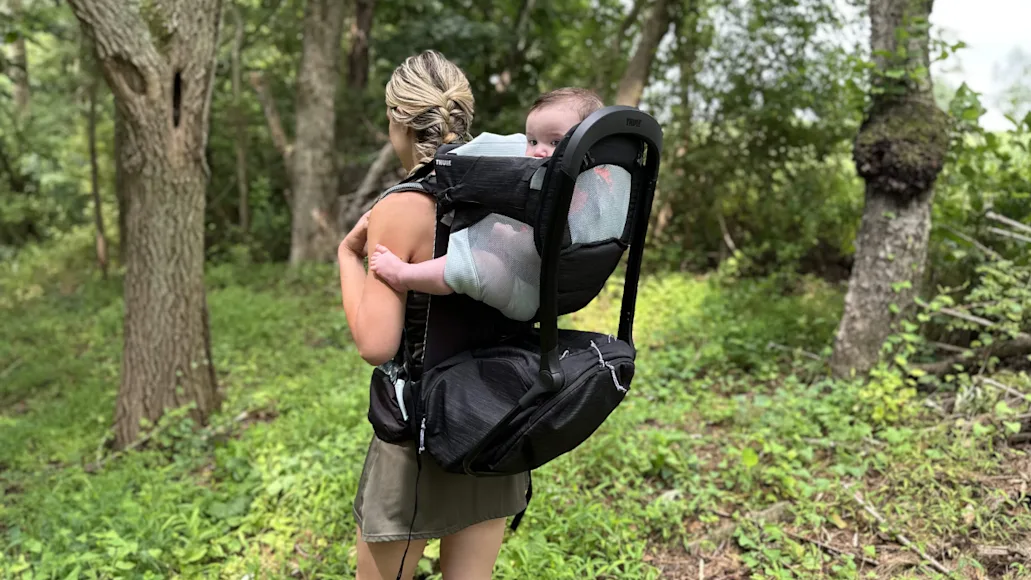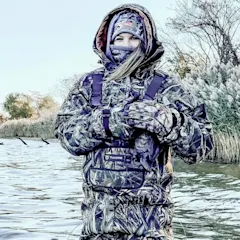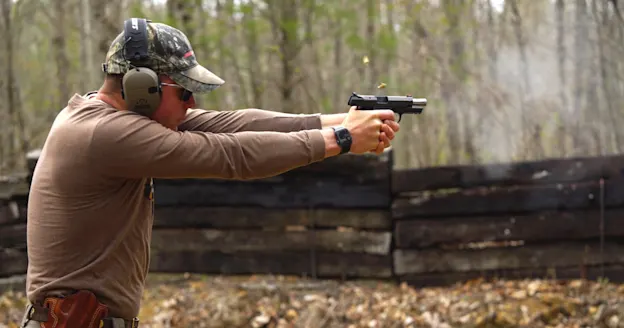_We may earn revenue from the products available on this page and participate in affiliate programs. Learn more ›
_
Best Overall
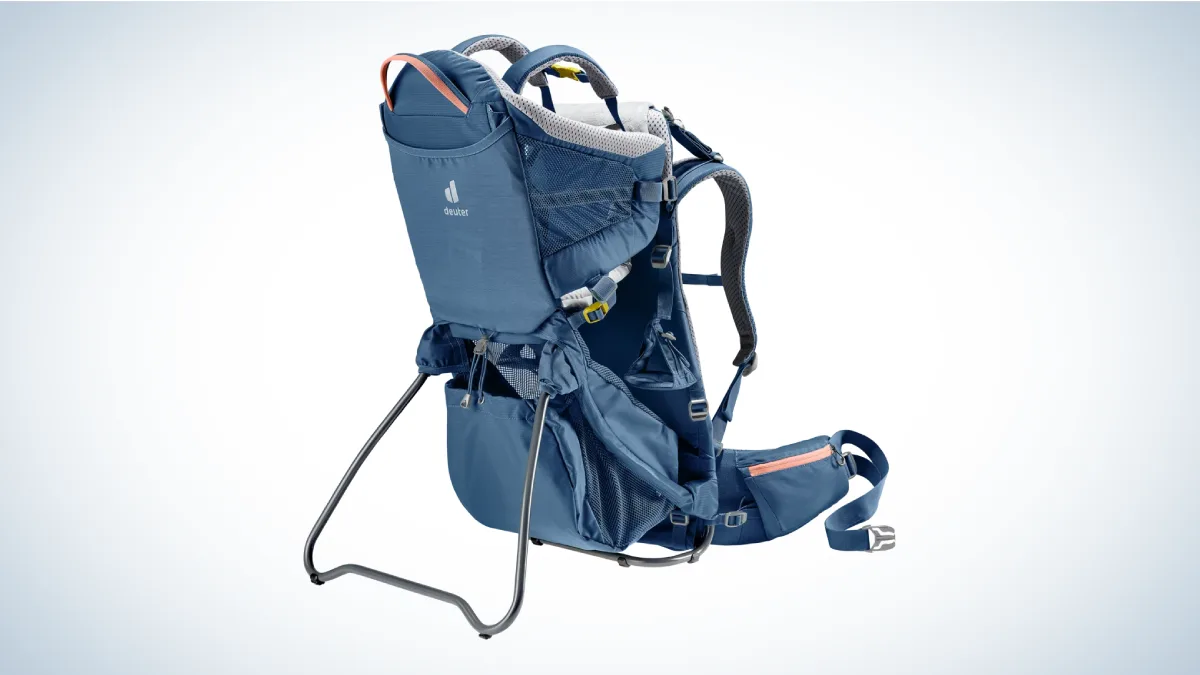
Deuter Kid Comfort
Best Lightweight
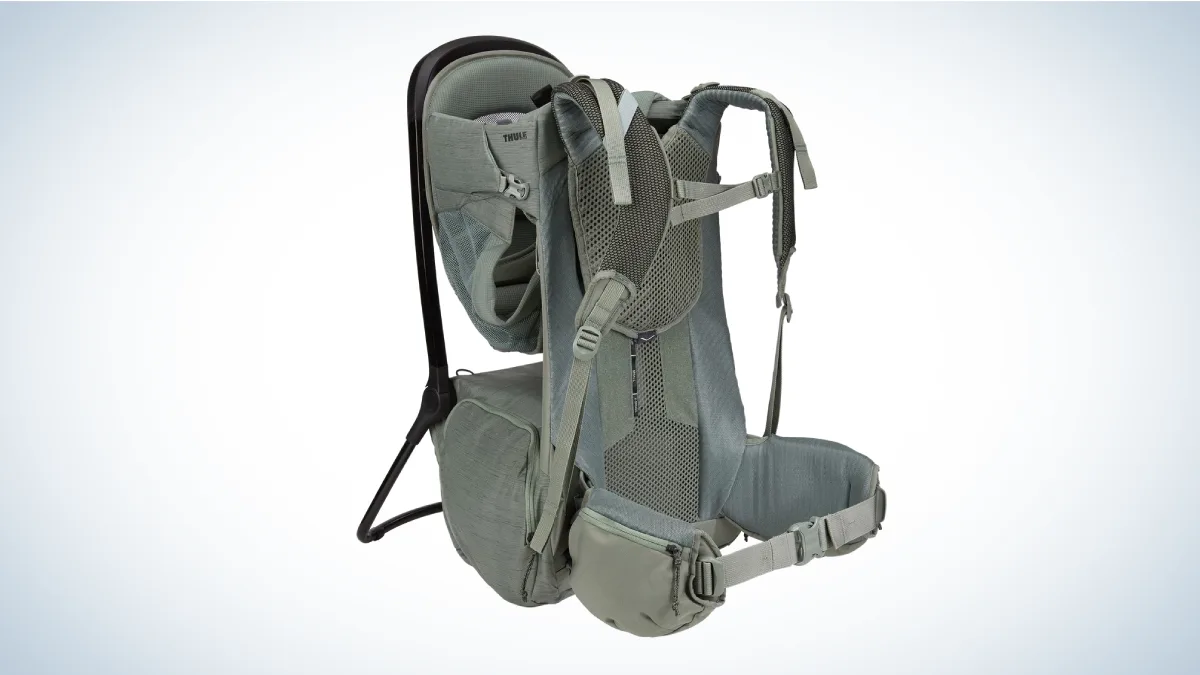
Thule Sapling
Best with Storage
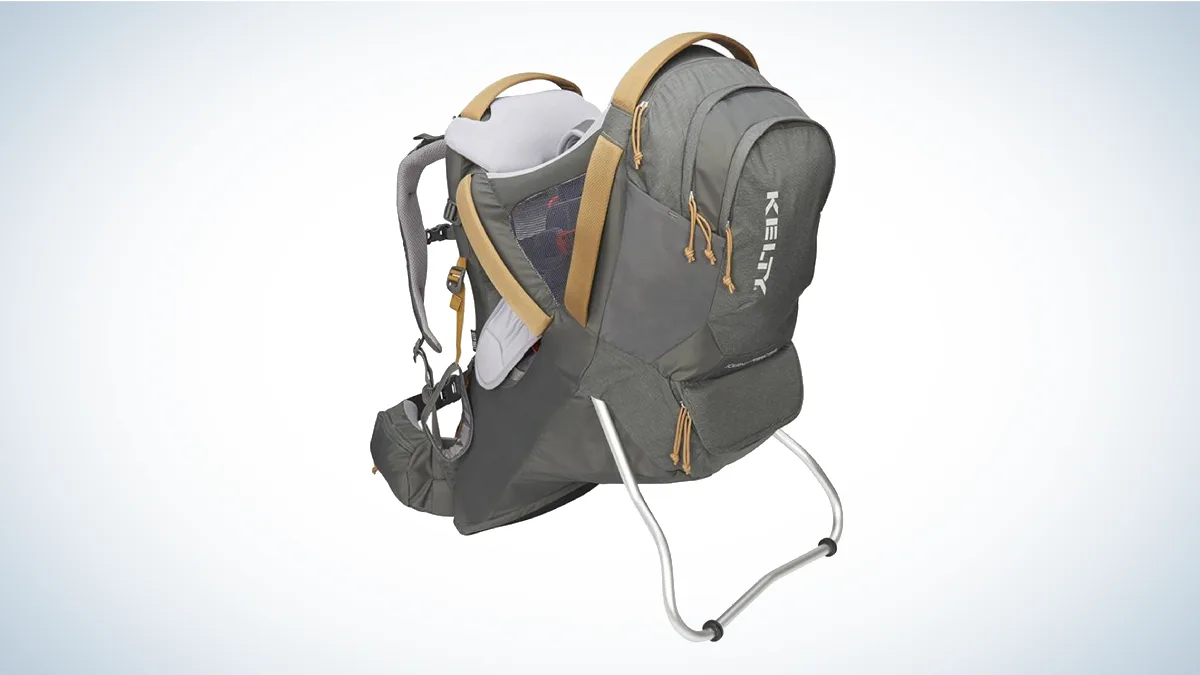
Kelty Journey PerfectFit Elite
As a new parent, you may want to go places a stroller can’t go—which is where a baby carrier for hiking comes in. When I had my first child in December, I knew that I wanted to spend as much time outside with her as I could. Exercise and stress relief for Mom, new sights and sounds for baby, fresh air and sunshine for both of us. While the stroller is fine for our morning walks on the paved trail near our house, it wouldn’t really cut it for rougher, more rugged terrain. So I decided to try a baby hiking carrier, which not only makes more practical sense, it also lets my little one see the world around her.
After hours of hiking and walking, I’ve chosen the best baby carriers for hiking, whether you’re looking for a lightweight frameless one you can also use in everyday life or the most decked-out backpack carrier for camping.
Best Overall: Kelty Journey PerfectFit Elite
Best with Storage: Deuter Kid Comfort
Best Lightweight: Thule Sapling
Best Rated: Osprey Poco Plus
Best Frameless: Baby Bjorn Carrier One Air
Best Budget: Chicco SmartSupport Backpack Carrier
How We Picked the Best Baby Carriers for Hiking
I started by narrowing down a list of the most popular toddler and baby hiking carriers based on personal knowledge and experience and customer reviews and ratings. Here are the characteristics I evaluated:
Carrier weight
Weight capacity
Comfort
Materials and construction
Safety
Storage and additional features
As a new mom myself, I was able to test a few of the popular baby carriers for hiking. I trekked trails with little 6-month-old Addison on my back in the carriers and also wore them around our backyard woods and while gardening just to get more of a feel for how comfortable they were and how well they stood up with frequent use.
Best Baby Carriers for Hiking: Reviews & Recommendations
Best Overall: Kelty Journey PerfectFit Elite
Best Overall

Specs
Weight of Carrier: 7.25 lbs
Minimum Weight: 16 lbs
Maximum Weight: 48.5 lbs
Pros
Well-made with lots of pockets
Comfortable to carry for hours on end
Easy to adjust for proper and secure fit
Safety features for baby
Cons
Bulky
The Kelty Journey PerfectFit Elite is a rig and a half—and it’s my absolute favorite carrier of the bunch. From the minute I unpacked it, I could tell it was just built different. The aluminum frame felt lightweight yet strong, while the waterproof polyester fabric featured reinforced stitching and a nice, thick texture. As I put it on for the first time, I liked the side handles that made it easy to get situated (something I’d come to appreciate even more once a baby was inside!). Adjusting the Kelty baby carrier was much more intuitive and less cumbersome than other carriers I tested, as well, thanks to the easy-to-figure-out straps and five-point safety harness.
As for comfort and design, this baby hiking carrier outperformed on so many levels. The cushioned waist belt and sternum straps (along with the “load lifters”) helped with weight distribution, which is incredibly important when you’re lugging around a 22-pound baby strapped to your back. After two hours of wearing Addison around in the Kelty, I didn’t have any aches or soreness. I was tired, sure, but nothing more—and that’s saying a lot.
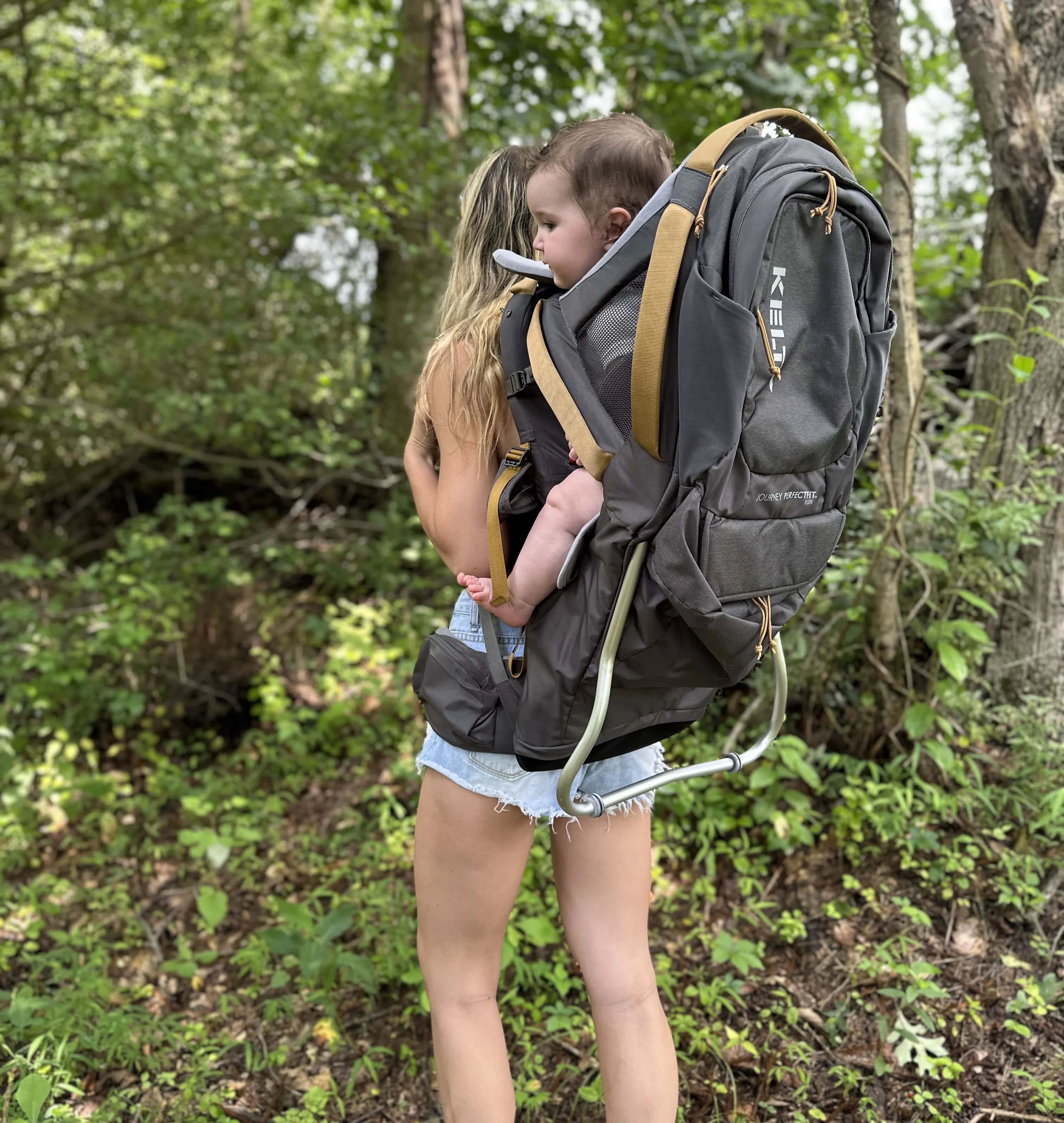
This Kelty baby carrier was by far my favorite of the bunch. -Amanda Oliver
The added features were so smart and well thought-out that I know this must’ve been designed by a fellow parent. One of the highlights is the ample storage space. There are nine pockets—which total a capacity of 26 liters—including hip belt pockets, elastic side pockets, and a larger zippered compartment. I had more than enough room to stash everything I needed for both me and Addison on our hike, eliminating the need for an additional bag.
To sum it up, I think the Kelty Journey PerfectFit Elite has all the features and benefits of the rest of the carriers I tested combined into one comfy and well-made carrier. The attention to detail is incredible and I’d recommend it to any parent who likes to spend time outdoors with their little one, from avid backpackers to casual hikers.
Best with Storage: Deuter Kid Comfort
Best with Storage

Specs
Weight of Carrier: 7.12 lbs
Minimum Weight: 19.8 lbs
Maximum Weight: 53 lbs
Pros
Plenty of zippered storage space
Adjustable to fit almost any body size and shape
Designed with comfort for baby and parent in mind
Cons
No integrated sunshade
Every parent is well aware of just how much crap (er, stuff) you have to lug around whenever you go anywhere—diapers, bottles, burp cloths, wipes, pacifiers, sunscreen, toys, snacks, etc. Unless you are miraculously able to tote around a diaper bag and a baby on your back, choosing a baby carrier with storage is a smart idea. The Deuter Kid Comfort doesn’t disappoint in that arena. Between the zippered pockets, elastic pockets in various sizes, hip belt pockets, and key clip, it has ample storage space for anything and everything your little one could need while hiking.
This Deuter child carrier is designed for maximum comfort for both you and your baby. Let’s start with the features for you. Think: an arched frame that evenly distributes weight, straps that are both width- and height-adjustable, and plenty of ventilation and foam padding all over. The carrier also has flexible “fins” on the side that allow it to essentially contour to your body and move with you as you move. Next are the features for your baby. Here, we’re looking at an ergonomic pillow and side cushioning, adjustable foot stirrups, and a padded harness.
Additionally, I really appreciate that the fabric exterior is completely removable and machine-washable. That’s a godsend when you’re a busy parent. The one mark against the Deuter Kid Comfort is that there isn’t a built-in sunshade. Fortunately, you can buy a sun roof accessory that attaches to the carrier but it’s sold separately.
Best Lightweight: Thule Sapling
Best Lightweight

Specs
Weight of Carrier: 7 lbs
Minimum Weight: NA
Maximum Weight: 48.5 lbs
Pros
Easy to load and unload baby
Lightweight and breathable
Built-in kickstand
Made with recycled materials
Cons
Expensive
At just 7 pounds, the Thule Sapling is one of the lightest framed baby carriers available and even packs down small when not in use. But don’t let that fool you in terms of its capability and durability. It can still hold up to 48.5 pounds and is built to last with a strong frame and durable recycled material fabric. Thanks to the dual-access design and adjustable straps, it’s easy to get your baby in and out of the cockpit and the Thule even has a kickstand that allows you to stand the pack up on the ground. In terms of storage, you’ll get a roomy 22L compartment underneath your baby’s seat where you can stash goodies, along with two zippered hip belt pockets should you need something easily accessible.
Back to the seat. Thule uses a unique ErgoRide seat that provides more support for your child than the traditional carrier seat. While it doesn’t have the leg stirrups that others have, Thule claims that the ErgoRide is designed not to need stirrups. While Addison isn’t big enough to need so much under-leg support, I could instantly tell the difference in the ErgoRide and am excited to see how it adds to her experience (and comfort) as she grows. Bonus: It’s removable and machine washable for easy cleaning.
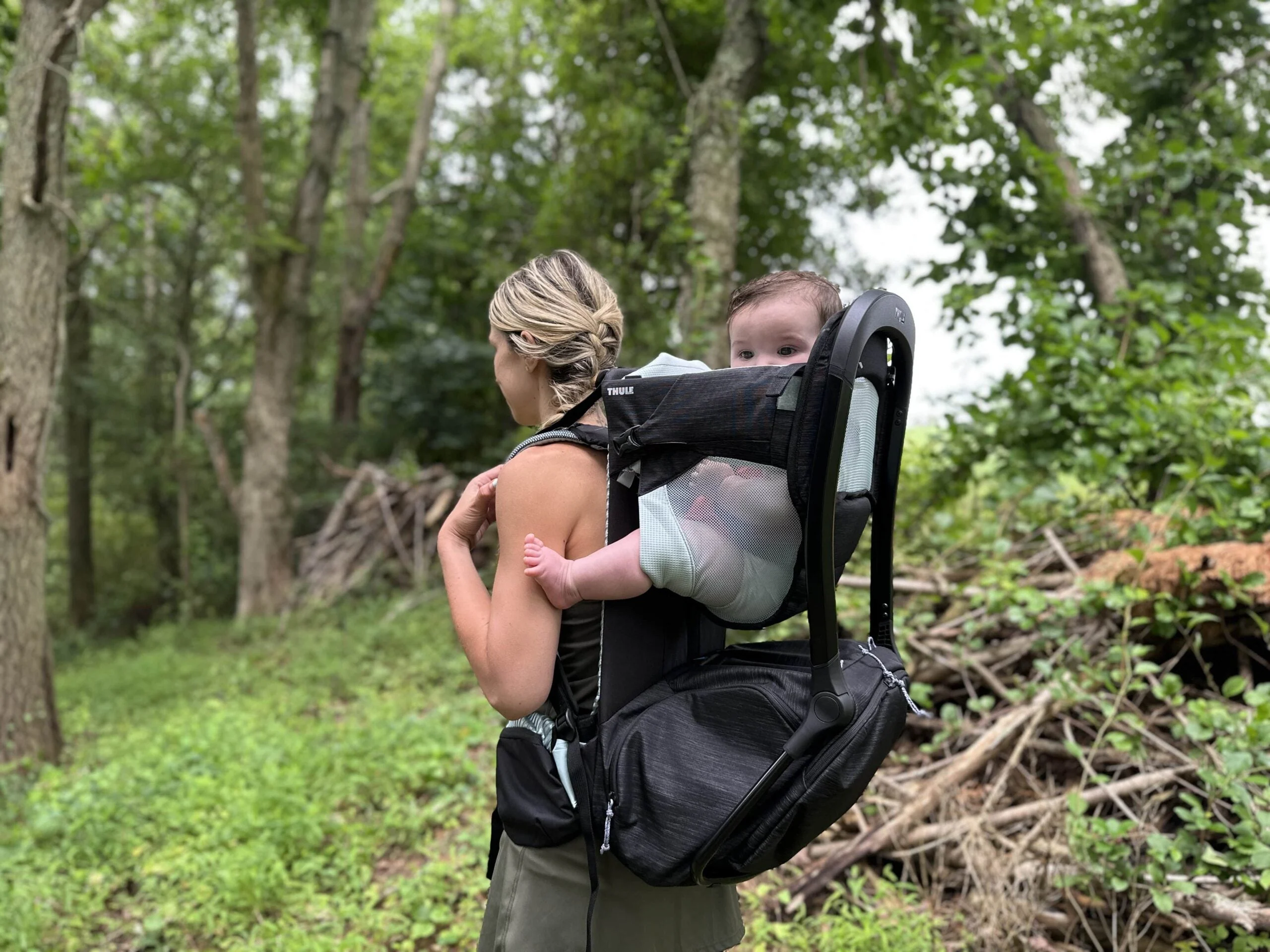
There’s plenty of room for baby to grow—and plenty of storage space—in the Thule Sapling. -Amanda Oliver
Of course, the light weight means that Thule had to sacrifice some of the additional padding you’ll find on other carriers on this list. It’s still comfortable—just maybe not as comfortable. You’ll also pay upwards of $400 for this bad boy, so it’s an investment. Fortunately, however, it should last you for as long as your baby (or toddler) will need to be carried, making it a one-and-done purchase.
Best Rated: Osprey Poco Plus
Best Rated
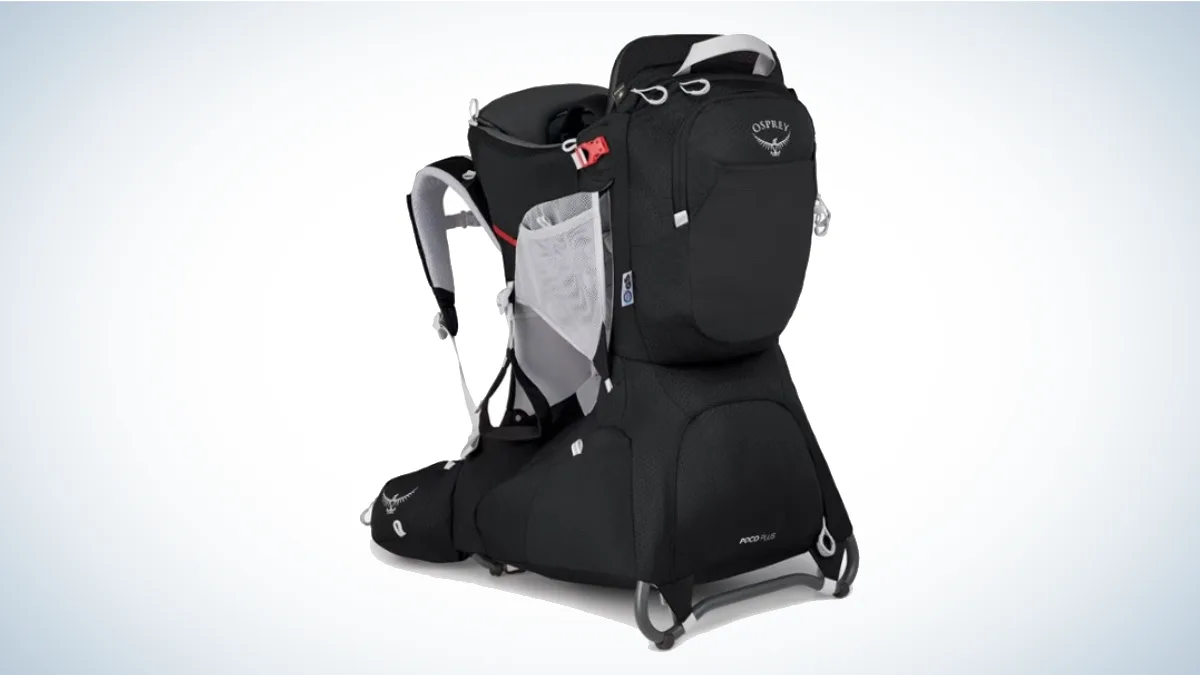
Specs
Weight of Carrier: 7.89 lbs
Minimum Weight: 24 lbs
Maximum Weight: 48 lbs
Pros
Plenty of storage space
A lot of unique and convenient features
Highly adjustable to fit all bodies
Cons
Bulky and hard to store
Osprey is well-known for its backpacking backpacks
but the brand also makes some great child carriers for hiking. The Osprey Poco Plus is the most popular, and for good reason. For starters, it’s designed to fit anyone and everyone, from my 5-foot-5 frame to my 6-foot-2 husband. You can easily adjust everything from the shoulder straps and sternum strap to the torso strap and hipbelt. There is just as much adjustability for the child’s seat, as well. The breathable mesh material keeps both me and my little one cool while we’re out on the trail—a huge plus when it’s 90 degrees out and I’m lugging around a 20-pound baby on my back.
What I love most about this Osprey child carrier, however, is all of the thoughtful features included. The integrated sunshade protects my baby’s sensitive skin, while the toy loop is perfect for hooking pacifiers and other gadgets so Addison doesn’t drop them while we’re walking. The removable drool pad is a genius addition, since she’s currently teething (and thus very slobbery). I also like how many spacious pockets there are—both zippered and open. They’re a great size for stashing diapers and other baby essentials along with water bottles and snacks.
Best Frameless: Baby Bjorn Baby Carrier One Air
Best Frameless
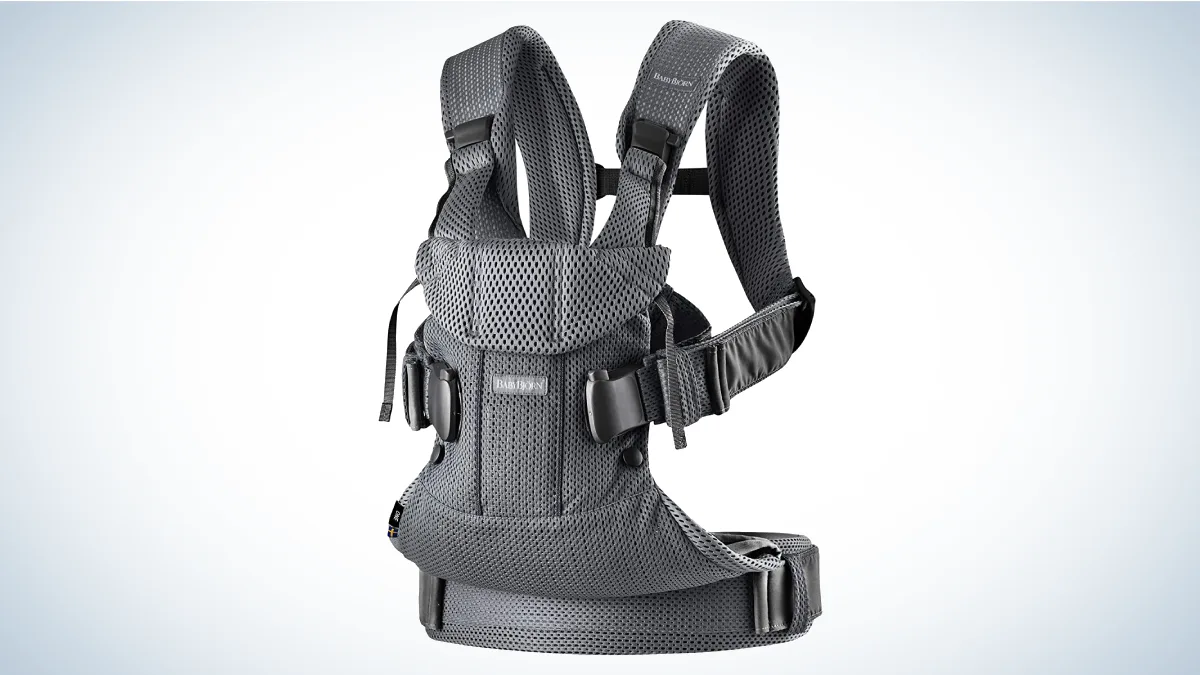
Specs
Weight of Carrier: 2.21 lbs
Minimum Weight: 8 lbs
Maximum Weight: 33 lbs
Pros
Comfortable and easy to adjust
Breathable material for warmer days
Versatile—you can use it for more than hiking
Cons
Not as supportive
Since becoming a mom, I’ve tried out a few frameless baby carriers and my issue is always how difficult they are to put on and get baby situated, especially if you don’t have another person helping. I didn’t experience that at all with the Baby Bjorn One Air—it was intuitive to figure out from the start (I didn’t have to thumb through pages of complicated instructions) and getting Addison in by myself without a struggle was so easy. I can’t stop raving about how simple it is to put on and take off and adjust while she’s sitting inside. You just have to pull a few straps, clip a buckle or two, and be on your way. Unlike with other front-facing baby carriers, I never felt like Addison was going to slip out while I was getting everything adjusted. It feels very secure from start to finish.
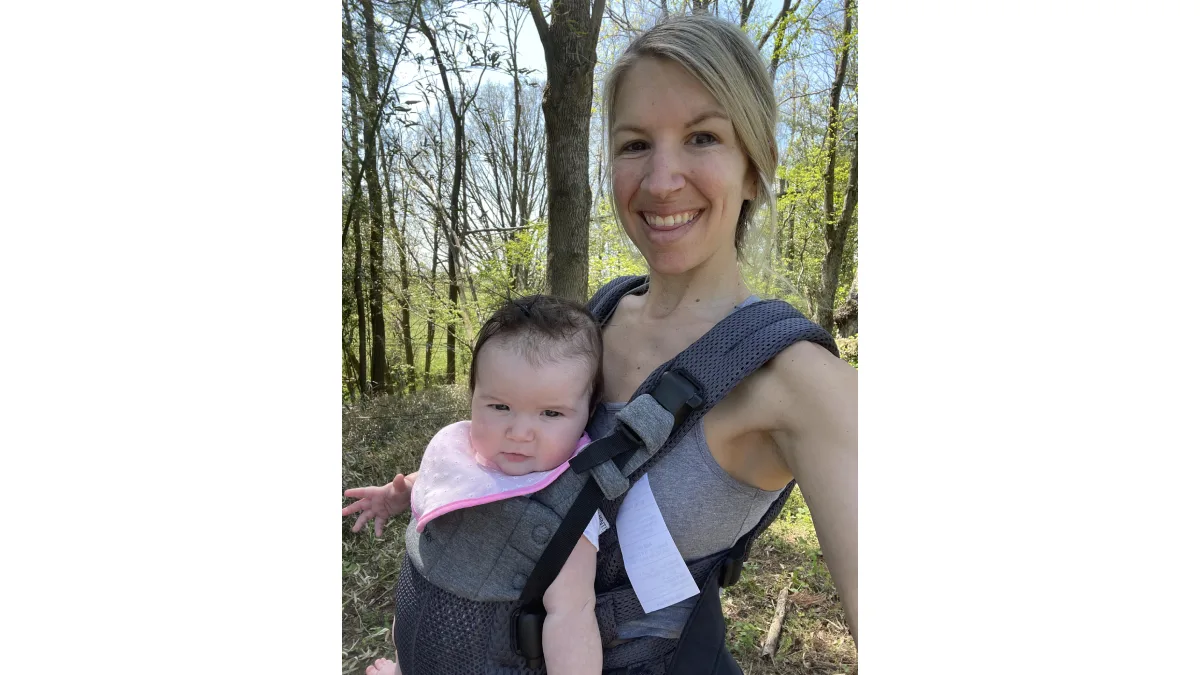
Addison loves looking around while she’s in the Baby Bjorn.
On to the comfort factor. This Baby Bjorn baby carrier is the most comfortable of the frameless ones I’ve used. The mesh makes it lightweight and breathable and the straps are wide and padded enough that they don’t cut into me or chafe (even when lugging around an almost 20-pound baby!). I like that I can use it for more than just hiking and camping, as well. I’ve carried Addison to the grocery store, around the house, and at parties with the Baby Bjorn carrier.
Best Budget: Chicco SmartSupport Backpack Carrier
Best Budget
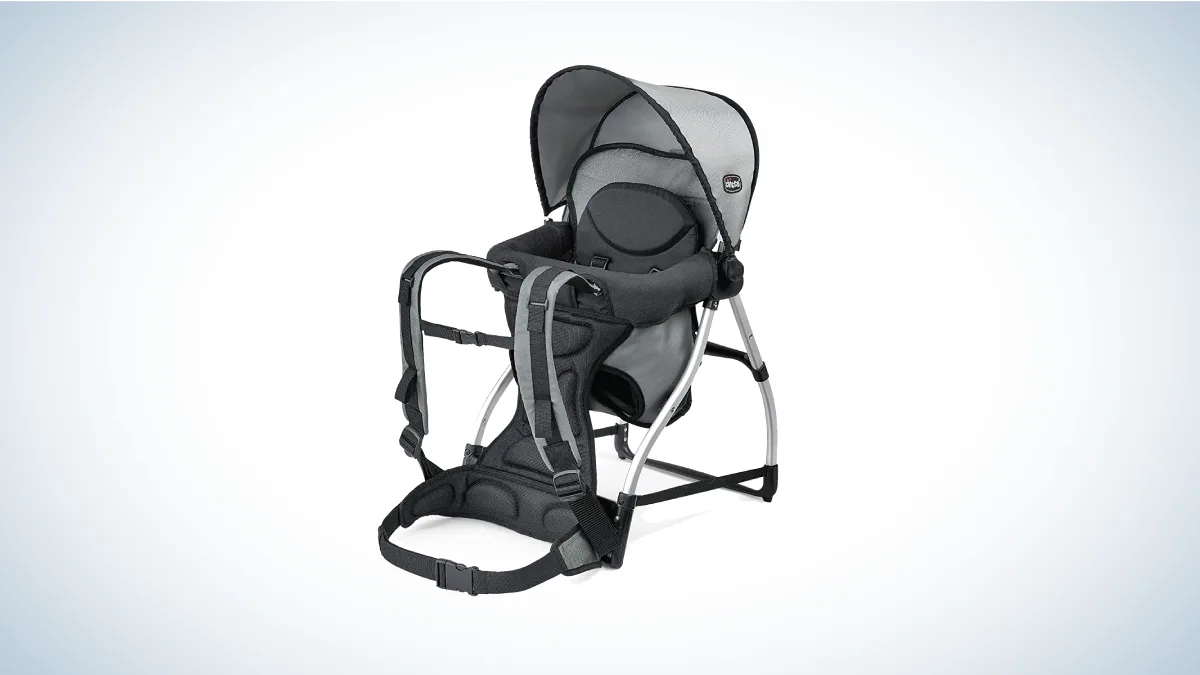
Specs
Weight of Carrier: 6.2 lbs
Minimum Weight: 17 lbs
Maximum Weight: 40 lbs
Pros
Affordable price
Built-in kickstand for loading
Easy to set up
Cons
No storage
Lacking in padding
If you don’t want to spend hundreds on a baby hiking carrier (that’s money that could go to much-needed diapers, wipes, and formula), good news—you can get this Chicco backpack carrier for under $150. What I love about this carrier is how easy it is to set up. While some backpack carriers can be cumbersome to set up and adjust, this one was basically ready to go right out of the box. All you have to do is unfold it. Loading is just as easy thanks to the kickstand feature. I was able to set the backpack on the ground and get Addison all settled without any awkward wrangling. This is especially nice if you’re alone and don’t have someone to help you get your baby inside.
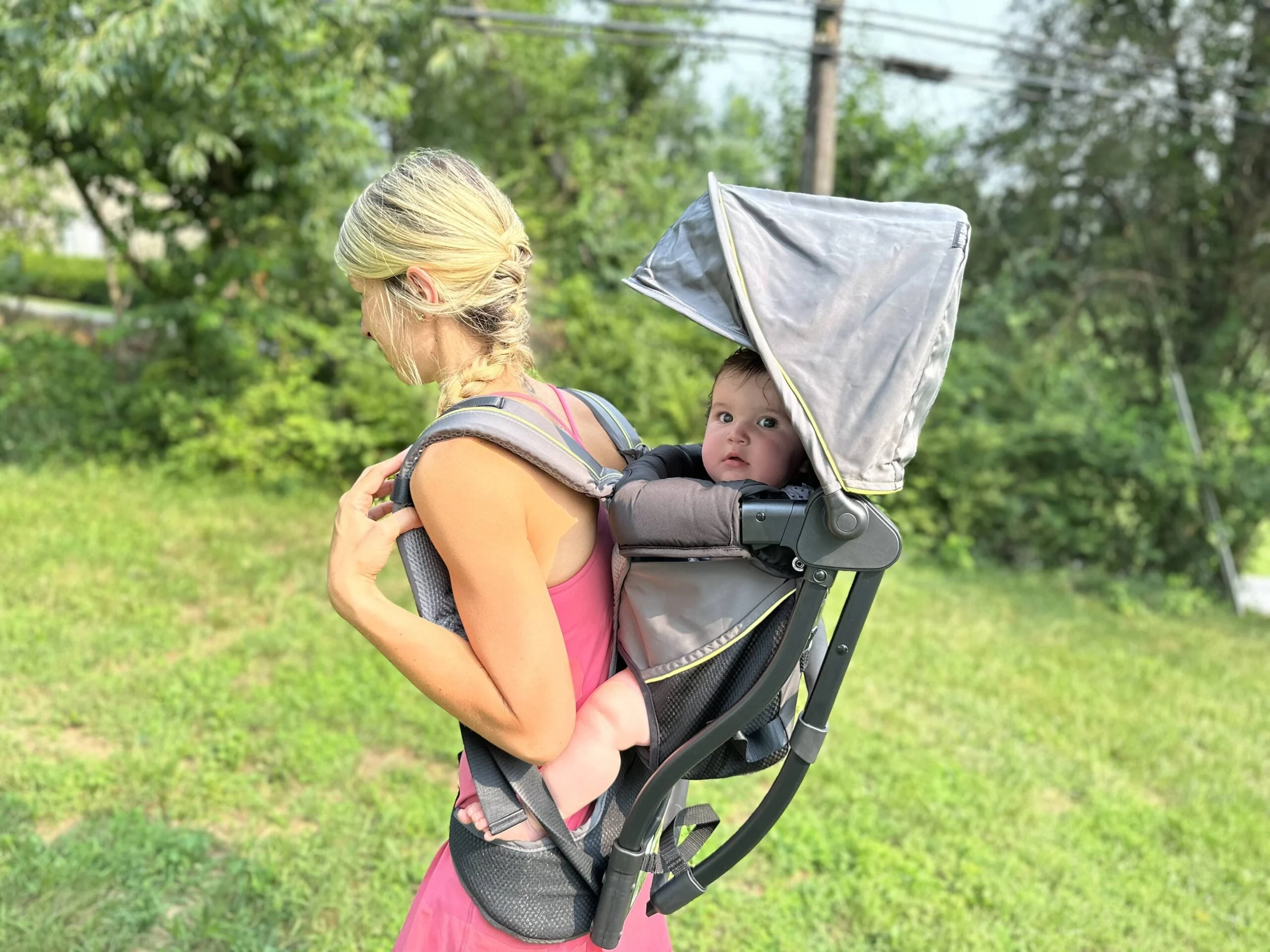
The built-in sun shade is one of the best parts of the Chicco carrier. -Amanda Oliver
At just over 6 pounds, the Chicco carrier is one of the lightest hiking baby carriers out there. Yet it can hold up to 40 pounds and has an adjustable seat that you can move up and down to accommodate your growing baby. The built-in sun shade deploys easily and it provided adequate protection from the sun when Addison and I were out on the trail.
The biggest downside to this carrier, however, is that there is zero storage space. That means you’ll need to carry a separate bag or fanny pack with all your gear. It also lacks padding where other carriers have it, like on the baby harness and the straps for the parent. It’s still comfortable to carry for short periods of time—and a great no-frills option for anyone on a budget—but I’m not sure how well it would work for longer hikes that last for hours.
What to Consider When Choosing a Baby Hiking Carrier
When you’re picking out the right baby hiking carrier for your family, you have to consider what’s best for you and what’s best for your baby. After all, you’re the one who has to carry it around and they’re the ones who have to sit in it for potentially hours. These are three key characteristics I evaluate when shopping for a carrier.
Comfort
There’s a lot to think about when it comes to finding a comfortable baby hiking carrier. Let’s start with the padding. Many carriers have padding along the straps and behind baby’s head so they can lean back (or even nap) while you’re walking. Others also have a drool pad in the front. Note, however, that more padding means a heavier carrier.
The straps will also play a huge part in how comfortable a carrier is. Look for easy-to-adjust straps that you can customize to fit your specific body shape and size. You’ll also want adjustable straps or a harness for your baby that can be let out as they grow.
Other things to consider for comfort include the weight of the carrier itself, how bulky it is, and how comfy and supportive the cockpit is for your little one. Some carriers offer feet stirrups, extra ventilation and mesh sections for breathability, and built-in sunshades to protect your baby from the sun.
Safety
Safety is of utmost importance with any baby-related gear, and a hiking carrier is no different. A five-point harness keeps your baby safely secured in the carrier and seated in the correct position by supporting their shoulders and hips. Other features can also affect your baby’s safety. For example, foot stirrups provide support to your baby’s legs so they don’t lose circulation while side access panels keep your little one snugly inside.
Durability
Many framed baby hiking carriers cost upwards of $200, so you’ll want one that can last for at least a year—and ideally for the duration of the time your baby requires a carrier (a.k.a. until they can/want to walk on their own). Pay close attention to the quality of the materials used and how well-constructed the carrier frame is.
On this note, I recommend checking on the warranty offered, as well. Thule, for example, provides a limited lifetime warranty on its products, covering defects in materials or construction. This can help protect you from investing in a carrier only to have it break on you a few trips in.
FAQs
Do baby carriers expire?
Unlike carseats, baby carriers don’t have a listed expiration date. That said, however, over time the materials and craftsmanship will break down—so they won’t last forever. With proper use and care, you should expect to be able to use your baby hiking carrier for two years or so.
How do you carry a baby while hiking?
You have two options when it comes to carrying positions while hiking: a front-facing carrier or a hiking backpack carrier. A backpack carrier tends to be more comfortable and easier for navigating the trail. However, you can’t use a backpack carrier until your baby can properly hold their head up on their own (usually around six months). Infants must be carried in a front-facing carrier for safety.
Can you backpack with a newborn?
This is entirely up to you as the parent—you can start backpacking or hiking with a newborn as soon as you’re comfortable with it. Maybe that’s when they’re a few weeks old, maybe that’s when they’re a few months old. There’s no rule.
Best Baby Carriers for Hiking: Final Thoughts
Best Overall: Kelty Journey PerfectFit Elite
Best with Storage: Deuter Kid Comfort
Best Lightweight: Thule Sapling
Best Rated: Osprey Poco Plus
Best Frameless: Baby Bjorn Carrier One Air
Best Budget: Chicco SmartSupport Backpack Carrier
Whether you’re going on a day hike or an overnight backpacking trip with your little one, the best baby carriers for hiking are the ones that are comfortable and safe for both the baby and the parent. While all the carriers on this list check those boxes, the Kelty Journey PerfectFit Elite
stood out as the best overall. It distributes weight evenly—making it comfy to tote around for miles on the trail—and has plenty of cushioning, adjustability, and added features like storage space and a built-in sunshade.
Why Trust Us
For more than 125 years, Field & Stream has been providing readers with honest and authentic coverage of outdoor gear. Our writers and editors eat, sleep, and breathe the outdoors, and that passion comes through in our product reviews. You can count on F&S to keep you up to date on the best new gear. And when we write about a product—whether it’s a bass lure or a backpack—we cover the good and the bad, so you know exactly what to expect before you decide to make a purchase.

